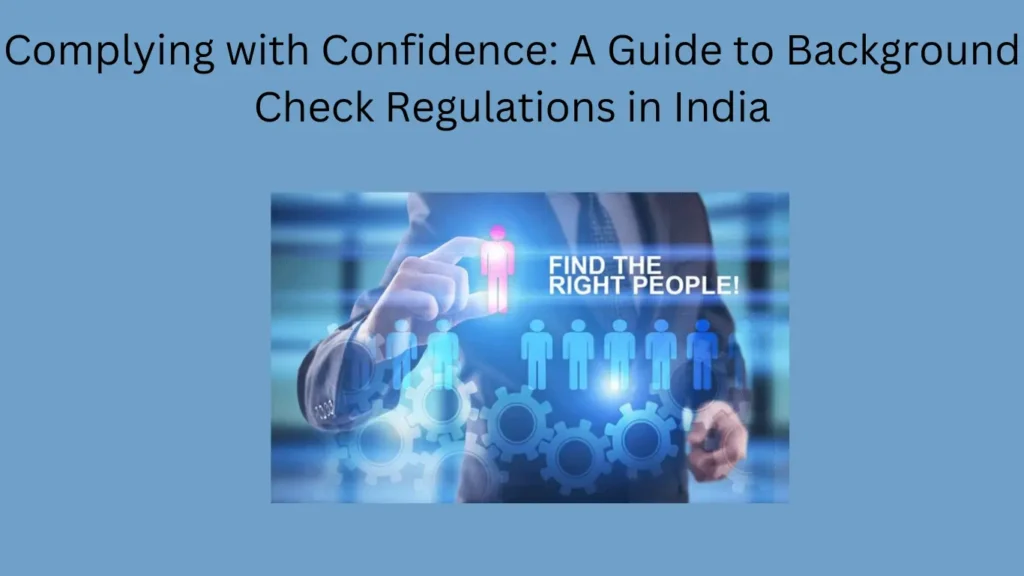In an era where trust and transparency are paramount, understanding and navigating background check regulations is crucial for both employers and employees. This guide is designed to empower individuals and organizations alike, providing comprehensive insights into background check regulations in India with a people-first approach.
The Significance of Background Checks
Building Trust in the Workplace
Background checks play a pivotal role in fostering trust within the workplace. For employers, it is a means of ensuring that potential hires possess the qualifications and credentials they claim. For employees, it establishes a level playing field, promoting a fair and transparent hiring process.
Legal Compliance
Background checks are not just good practice; they are a legal requirement. Adhering to background check regulations helps organizations maintain compliance with the law, reducing legal risks and ensuring a fair and ethical work environment.
Key Components of Background Check Regulations in India
Consent and Authorization
One of the fundamental principles is obtaining consent from individuals before conducting background checks. Employers must inform candidates or employees about the purpose and scope of the check and secure their authorization in writing.
Data Privacy and Protection
Ensuring the privacy and protection of personal data is paramount. Background check regulations emphasize responsible handling of sensitive information, requiring organizations to implement robust data protection measures to safeguard individuals’ privacy.
Navigating the Background Check Process
Transparent Communication
A people-first approach begins with transparent communication. Employers should openly communicate the intent and process of background checks to candidates or employees, creating an atmosphere of trust and understanding.
Timely Reporting
Background checks should be conducted promptly and efficiently. Delays in the process can impact hiring timelines and create unnecessary stress for individuals. Employers should strive for timely reporting while maintaining accuracy and thoroughness.
People-First Practices for Employers
Clear Policies and Procedures
Employers should establish clear and accessible policies and procedures regarding background checks. This ensures that both employers and employees are aware of the processes involved, fostering a culture of openness and accountability.
Support and Guidance
Recognizing that the background check process can be a source of anxiety for individuals, employers should provide support and guidance. This includes addressing any concerns, explaining the results comprehensively, and allowing individuals the opportunity to address discrepancies.
Empowering Individuals in the Background Check Process
Know Your Rights
Individuals have the right to know the details of the background check process. Employers should educate candidates and employees on their rights, promoting transparency and ensuring that individuals are well-informed participants in the process.
Redressal Mechanism
Establishing a redressal mechanism is essential. If discrepancies arise during the background check, individuals should have a fair opportunity to dispute and rectify inaccuracies. This ensures a fair and just process for all parties involved.
Conclusion: Building Trust Through Compliance
Navigating background check regulations in India is about more than just compliance; it’s about building trust and maintaining transparency in the workplace. By adopting a people-first approach, organizations can foster a culture of confidence, ensuring that background checks are conducted ethically, fairly, and with the utmost respect for individual rights.
For further Inquires Contact Us
FAQs
1. Why are background checks significant in the workplace?
- Background checks build trust, ensuring that potential hires possess claimed qualifications, and are a legal requirement for maintaining a fair and ethical work environment.
2. What are the key components of background check regulations in India?
- Key components include obtaining consent, data privacy protection, and adherence to legal requirements, ensuring a thorough and fair background check process.
3. How can employers adopt a people-first approach in background checks?
- Employers can adopt a people-first approach through transparent communication, timely reporting, clear policies, support and guidance, and promoting employee rights and redressal mechanisms.
4. What rights do individuals have in the background check process?
- Individuals have the right to know the details of the background check process, and employers should educate them on their rights, ensuring transparency and informed participation.
5. Why is a redressal mechanism important in background checks?
- A redressal mechanism allows individuals to dispute and rectify inaccuracies, ensuring a fair and just process and building trust through accountability.
